EU Sanctions Chinese Video Surveillance Firm’s Representative In Iran

The European Union has sanctioned a company and its manager for violating human rights through the sale of Chinese Tiandy video surveillance equipment in Iran.

The European Union has sanctioned a company and its manager for violating human rights through the sale of Chinese Tiandy video surveillance equipment in Iran.
As the only official representative of Tiandy in Iran, Radi Vira Tejarat Company imports and sells surveillance equipment to government security outfits such as the Revolutionary Guard, its Basij paramilitary force and the police.
Earlier, NBC news in a report investigated Tiandy's cooperation with Iran's security and military institutions that helps them to identify protesters.
According to the report, Tiandy, as one of the four major suppliers of surveillance cameras in China, has signed a five-year contract with the Iranian security and intelligence organizations.
Last month, Washington placed Tiandy on its sanctions list for selling surveillancecameras to the Islamic Revolutionary Guard Corps (IRGC) and also the use of its technology in suppressing Uyghur Muslims.
The European Union says Radis Vira Tejarat is a key intermediary in providing the most advanced surveillance equipment for the Islamic Republic of Iran.
Tiandy is a private firm based in the northern city of Tianjin, which ranks among the top video surveillance companies in China and the world.
An industry survey says the annual sales revenue of Tiandy was more than $800 million in 2021 with branches in over 60 countries.
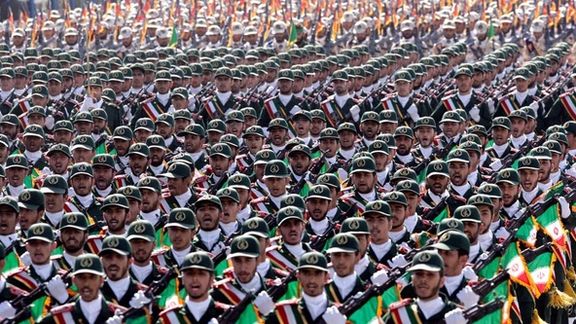
Iran’s foreign minister says EU foreign policy chief’s hints that the body would not list IRGC as a terrorist outfit proves that the bloc is not seeking to take costly measures.
Hossein Amir-Abdollahian made the remarks on Monday, hours after comments by Josep Borrell, the High Representative of the European Union for Foreign Affairs and Security Policy, who said the EU cannot list Iran's Revolutionary Guard as a terrorist entity until an EU court has determined that they are.
On Monday, Foreign Ministry spokesman Nasser Kanaani reiterated that the plan to designate the IRGC as a terror group violates the UN Charter, dismissing the European Parliament resolution as an “irresponsible and illogical” move.
Following an overwhelming vote last week, the European Parliament called on the EU to list the Revolutionary Guards as a terrorist entity, blaming it for the repression of domestic protests and the supply of drones to Russia.
"On Iran, we are going to discuss new personal sanctions according with the legal framework on human rights,” Borrell said, emphasizing that the court of an EU member had to issue a concrete legal condemnation before the EU could designate the IRGC as a terror group.
On the sidelines of the EU foreign ministers meeting in Brussels on Monday, French Foreign Minister Catherine Colonna said that “regarding the IRCG, may I remind you that they are already as a group under sanction since 2010 because of their participation in proliferation activities related to weapons of mass destruction. Now we are considering, but this is not a decision to be made today, we're considering to sanction them under another regime. We're looking closely at it and nothing is ruled out."
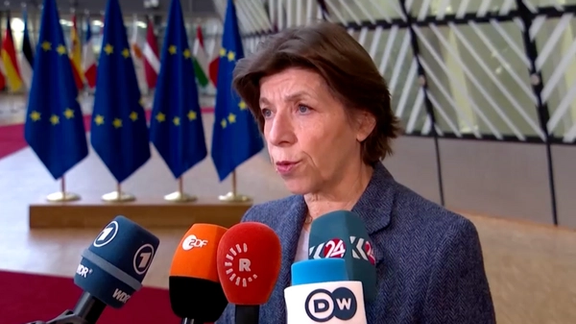
However, the EU on Monday introduced a new package of sanctions against 18 individuals and 19 entities for a "brutal" crackdown on protests, ignited by the death in custody of 22-year-old Mahsa Amini.
“Among the persons enlisted are representatives of the government and the Iranian parliament (Majles), important political and media figures, as well as high-ranking members of the Iranian security forces, including of Iran’s Islamic Revolutionary Guard Corps (IRGC),” EU said.
Restrictive EU measures now apply to a total of 164 individuals and 31 entities. They consist of an asset freeze, a travel ban to the EU, and a prohibition to make funds or economic resources available to those listed, read a statement by the EU council. “A ban on exports to Iran of equipment, which might be used for internal repression, and of equipment for monitoring telecommunications, is also in place.”
Earlier in the day, UK also sanctioned more Iranian figures over human rights violations including the recent execution of British-Iranian dual national Alireza Akbari.
In coordination with Britain and the EU, the United States imposed sanctions on IRGC’s Cooperative Foundation and senior Iranian officials on Monday, stepping up pressure on Tehran over its crackdown on protests.
Monday's action targets a "key economic pillar of the IRGC, which funds much of the regime’s brutal suppression; as well as senior security officials coordinating Tehran’s crackdown at the national and provincial levels," the US Treasury Department said in a statement.
The Treasury described the IRGC Cooperative Foundation as an economic conglomerate established by senior officials of the group to manage its investments and presence in sectors of Iran's economy. The Treasury also accused the IRGC outfit of having become "a wellspring of corruption and graft" and said funds from it have supported the IRGC's military adventures abroad.
"Along with our partners, we will continue to hold the Iranian regime accountable so long as it relies upon violence, sham trials, the execution of protestors, and other means of suppressing its people," the Treasury's Under Secretary for Terrorism and Financial Intelligence, Brian Nelson, said in the statement.
Relations between the 27-nation EU and Tehran have deteriorated during stalled efforts to revive talks on its nuclear program, worsening further as Iran has moved to detain several European nationals.
The United States has said it is not pursuing the revival of the 2015 nuclear deal, or the JCPOA, and instead its attention is on the popular movement in Iran and on Tehran’s supply of drones and missiles to Russia.
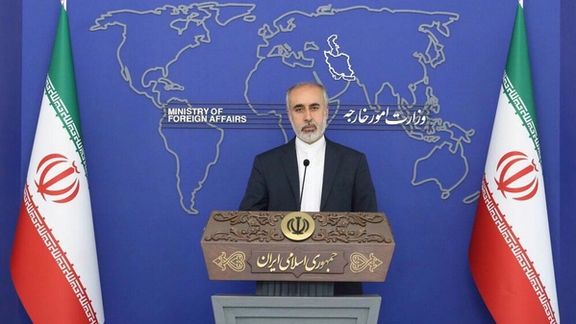
During his speech on Monday, the Iranian foreign ministry spokesman also talked about the negotiations to revive the 2015 nuclear deal, saying the absence of new rounds of talks “does not mean the absence of interaction or exchange of messages and views.” He noted that the talks serve the interests of both sides. The spokesman, however, stressed that there are no direct talks between Tehran and Washington.
As part of the threats that the Iranian officials are issuing to Europe, the country’s parliament also called on the government to retaliate against any punitive measures adopted by the EU.
Speaking on the sidelines of a closed session of the parliament on Sunday, Amir-Abdollahian said Iran can withdraw from the Treaty on the Non-Proliferation of Nuclear Weapons (NPT) and ban nuclear inspectors of the UN nuclear agency as countermeasures against the EU’s move against the IRGC.
The ties between Iran and the West have been growing increasingly sour in recent months over the regime’s human rights violations, its support for the Russian invasion of Ukraine, its uncooperative approach about the nuclear issues and its destabilizing activities across the region, and its hostage diplomacy.
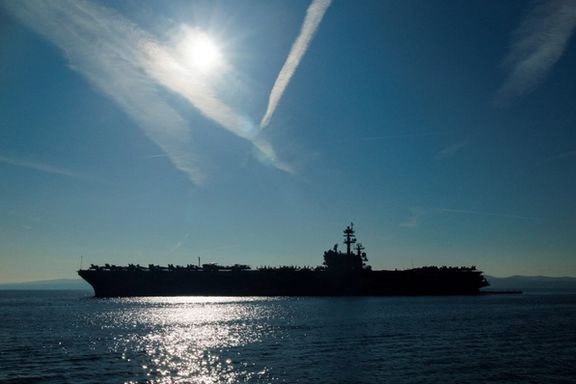
The United States and Israel Monday launched one of their biggest joint military war games, with thousands of forces, a dozen ships, and 142 aircraft, including nuclear-capable bombers.
A senior US defense official says the "Juniper Oak" exercises, which will run through Friday, are meant to demonstrate integration between the US and Israeli militaries amid growing tensions over Iran's nuclear program.
However, the US official said there would be no mockups of Iranian targets and that the exercises were not oriented around any particular adversary.
"I do think that the scale of the exercise is relevant to a whole range of scenarios, and Iran may draw certain inferences from that," the official acknowledged.
"It's really meant mostly to kick the tires on our ability to do things at this scale with the Israelis against a whole range of different threats."
The maneuvers will include live-fire exercises and involve 6,400 US forces, and Some 450 troops on the ground in Israel, the official underlined.
Drills will take place over large distances, involving land, sea, air and space, the official stated.
The planning for the exercises began only a couple of months ago, before conservative Israeli Prime Minister Benjamin Netanyahu regained top office on December 29.
The official said the drills would show how the United States could effectively surge large numbers of battle-ready forces into the Middle East, even as Washington focuses on Russia's invasion of Ukraine and intensifying competition with China.
Reporting by Reuters
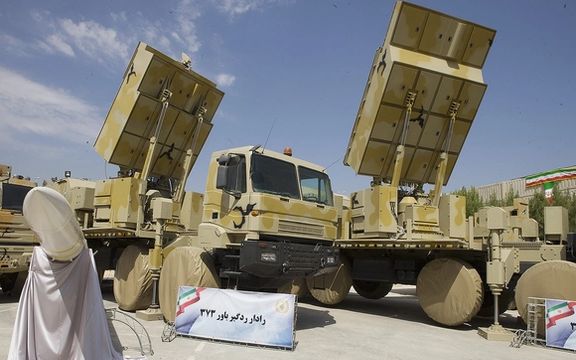
Amid new sanctions by Western countries on Iran’s Revolutionary Guard for human rights violations and other mischiefs, the multi-role organization is ramping up Syria’s air defense system, despite rampant poverty in Iran.
According to a report by the Newsweek earlier in the month, the Islamic Republic has invested tens of millions of dollars from the country's public budget for the deployment of a comprehensive aerial defense network in Syria.
Newsweek cited an unnamed intelligence source from a nation allied with the United States that the IRGC over the past two years has been “promoting the deployment of aerial defense capabilities on its behalf in Syria at a cost of tens of millions of dollars in order to deal with the Israeli airstrikes.”
Iran has played a major role in the Syrian conflict from 2011, by sending fighters and weapons to assist the Bashar al-Assad’s forces and entrench itself near Israel.
According to the source, IRGC Aerospace Force deputy commander Brig. Gen. Fereydoun Mohammadi Saghaei, is leading the air defense project.
Information obtained by Iran International revealed that the deployment of the air defense equipment was previously being carried out under the supervision of an IRGC’s Quds Force senior commander Javad Ghaffari, who was expelled from Syria last fall apparently over differences with the Russians, and now the mission is overseen by Mohammad Reza Zahedi, another Quds Force officer.
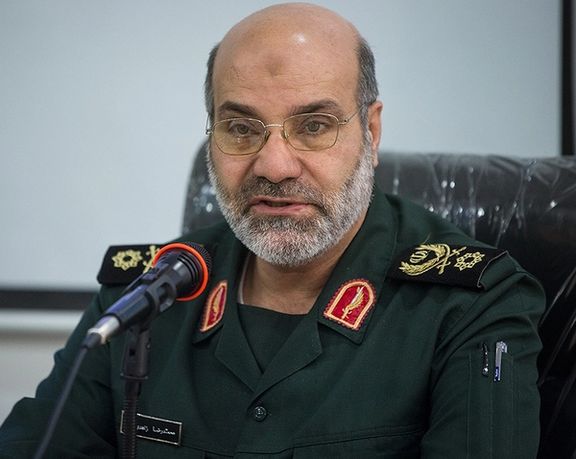
The team includes secret logistics agents who are familiar with the sensitive equipment in the field of air defense, such as Gholam Hassan Hosseini. Dozens of Syrian forces work under Hosseini. Previously, the Iranian agent coordinating the transfer of military equipment to Syria was Alireza Rezvani, whose alias is Yaser. Rezvani returned to Iran in fear for his life after his identity was revealed. Two members of Lebanese group Hezbollah are also involved in the project: Abbas Muhammad Al Dabs (left) and Muhammad Mahmoud Zalzli. Intelli Times earlier published diagrams of their faces.
"The promotion of these capabilities is carried out as a project shared with the Syrian army and possibly even with the aim of enabling independent Iranian operation of the aerial defense systems from within parts of Syria," the source told Newsweek, adding that “the Iranians assisted the Syrians in upgrading their radar array, designed to aid in detection and prevention of Israeli attacks—mainly against the Iranian establishment in Syria."
The weapons involved in the effort include Iran's Sayyad (Hunter) 4B solid-propellant missile, which was unveiled in November 2022. The projectile was paired with the Bavar-373 surface-to-air missile system and said to have a range of about 300 kilometers with a radar range of about 450 kilometers. It is reported that the system is capable of shooting down fifth-generation fighter aircraft, such as Israel’s advanced F-35I fighters.
Iranian officials claimed greater capabilities for the domestically produced system, calling it more advanced than the US-made Patriot surface-to-air missile system and Terminal High Altitude Area Defense (THAAD) anti-missile system as well as the Russia-built S-300 surface-to-air missile system.
The report mentioned several recent airstrikes in Syria that targeted the new Iranian air defense deployment efforts, including strikes in Palmyra and Tartus in October 2021, Latakia in December 2021, Damascus in March 2022, Tartus in July 2022, and two strikes in Homs in November and December 2022.
The source also said that at least 10 Iranians involved in the air defense efforts in Syria had been killed by Israel in recent years. The Islamic Republic has acknowledged some of these casualties, such as IRGC officers Ehsan Karbalaipour and Morteza Saeednejad, identified by various reports as air defense engineers who were killed in Damascus last March, and Col. Davoud Jafari, an adviser from the IRGC’s aerospace division who died by what Iran said was a roadside bomb near the capital Damascus in November.
Earlier in January, Israeli air strikes targeting Iran-linked assets in Syria hit the Damascus International Airport. Missiles also hit targets in the south of Damascus. Earlier, two regional intelligence sources said the strikes had hit an outpost near the airport of the IRGC’s Quds Force -- a division primarily responsible for extraterritorial military and clandestine operations – and its affiliated militias.
Earlier reports had said that Syria and Iran have been deploying the new air defense systems since late in November around Damascus. There were reports that the new systems were built by Korean and Chinese companies and provided by Iran as part of agreements reached between Damascus and Tehran.
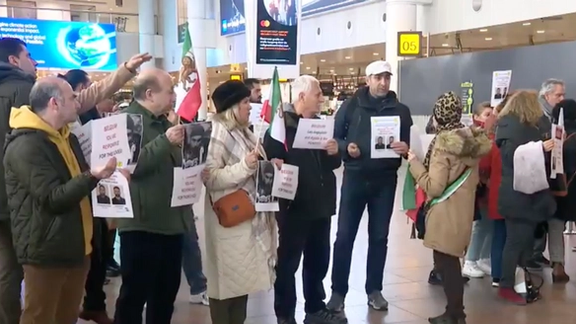
A group of people have held a gathering in Zaventem airport in Brussels on Monday to stop the expulsion of two Iranian refugees by the Belgian government.
The demonstrators held the gathering to prevent Mohammadreza Hamian and Alireza Hesam, both 22, to be sent home after their asylum application was rejected in December despite their attempts to gather as many documents as possible.
The men had arrived in Belgium after taking part in anti-government protests against the clerical rulers in Iran. However, they now fear for their lives.
“We have been in a closed reception center for 80 days, and no one hears our voice,” one of them told RTBF, the Belgian Radio-television of the French Community.
"The whole world knows what is happening in Iran for a few months. We were in the streets asking for freedom. The whole world knows what we risk if we go back to Iran ," they told RTBF from the center.
“Returning to Iran equals death, like what happened to many other young people like us in Iran ,” they say.
A Monday flight will take them to Turkey, and then they might be sent back to Iran.
Ali Amerian, the lawyer of these two asylum seekers, and Darya Safaei, an Iranian member of the Belgian Parliament, have asked the government to stop their deportation.
Nicole de Moor, the Secretary of State for Asylum and Migration said “asylum is really reserved for those who fear individual persecution, which was not the case for these two people, according to the independent analysis of our asylum authorities.”
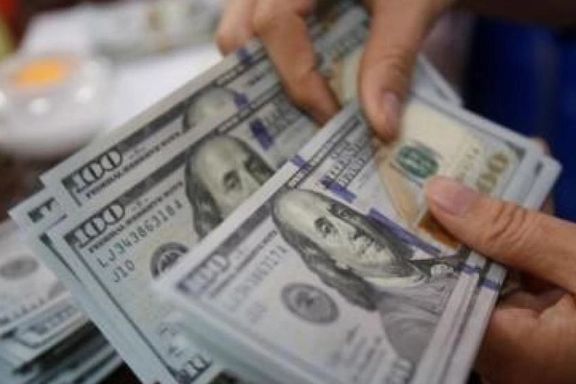
Iran’s government pumped $305 million into the currency market over two days, after the currency, rial, fell to a historic low of 450,000 against the US dollar.
The Central Bank of Iran announced that the dollars were made available on Saturday and Sunday at a special currency scheme known as NIMA, which is set up for foreign currencies to be sold at a lower rate by exporters and for importers to buy what they need at the same low rate to finance their purchases from other countries.
The system was set up to make imports cheaper and control rising prices, after US sanctions in 2018 practically devalued Iran’s currency and led to very high inflation. The rial has lost value 12-fold in five years.
The injection of $305 million into the NIMA system indicates that there are not enough dollars from exports and the government had to satisfy demand.
However, the US dollar is set at 285,000 to the dollar in the special government scheme versus the free market where it is traded at about 450,000. The discrepancy between the two breeds corruption, as well-connected individuals and companies can buy cheap dollars through NIMA and instead of using it to finance imports, sell it on the currency market.
Numerous cases of such corruption have been revealed since 2018, when cheap dollars obtained from the government to import essential goods were used to import thousands of luxury cars, or simply nothing.
The government also regularly sells dollar through the free market to currency dealers to support the beleaguered rial. Usually, these interventions have a limited and temporary effect.